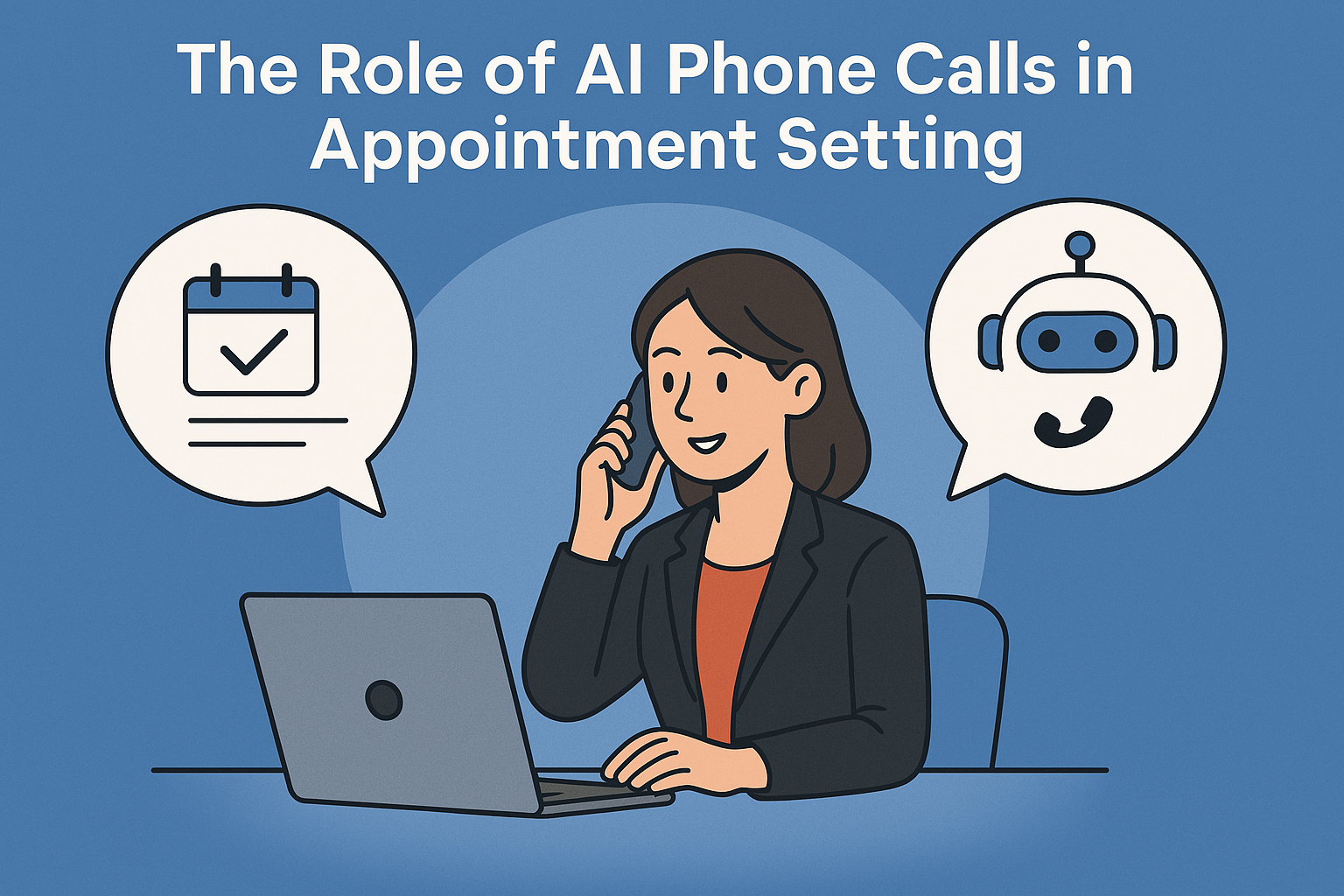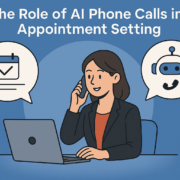The Role of AI Phone Calls in Appointment Setting: Boosting Efficiency Without Losing the Human Touch
The history of appointment setting changes over time due to new developments in technology and the like. This article is all about how appointment setting has changed over time due to artificial intelligence positioning companies to process quicker and more efficiently with less work on their part. Yet, with such a speedy development of technology, one would assume that a significant flaw would be that AI cannot offer the human connection required for everything to run smoothly. However, with various integration recommendations for using AI in the appointment setting field, it seems companies could reap huge benefits in efficiency while still maintaining human interaction where it is most beneficial.
AI Works Effectively During the Appointment-Setting Process
One of the most critical aspects of a calling process for appointment-setting is that it’s done quickly and effectively, meaning time and efficiency are not wasted over the course of many dealing. Human callers may take longer and get confused with complicated settings. However, an AI system can process necessary data in moments, even with multitudes of calls and complex appointments needed. Where humans might lose time trying to recheck mistakes or backtrack due to lost steps, AI works seamlessly to combine elements needed.
This doesn’t mean human assistance at figuring out an appointment isn’t needed, it’s just that with each element learned along the way, AI’s natural-language processing capabilities integrate so much faster and with fewer human faults that the process can keep going without re-assessment. AI phone calls make this possible by handling routine scheduling tasks with speed and precision, reducing the need for manual intervention. When there’s a potential for error by humanity, even through the simplest repetitive task, AI comes to the rescue. Not only does AI save on time and energy spent on less important tasks down the road, but it allows humans to be available for critical needs that depend upon personalized appointment setting.
AI Phone Calls Sound Human for the Appointment Setting Experience
Another concern for an effective appointment-setting experience is whether it sounds like AI and doesn’t have the human element incorporated. However, the latest setups for AI workforce reliance use historical and real-time data to generate concepts that already sound personalized. An AI phone system already knows what customers should be called (Mr. Vs. First Name). It should understand previous conversations about appointments if they occurred, specifics about where it happened or hours preferred in the past and more. The result is something that sounds so automated yet also sounds as if it’s had a history of interaction with the person previously to make it seem personal at that time. In many cases, it would sound like someone human because it knows how to say what it knows as long as it had printed guidance from other pieces of information it could rely upon in the past and recently.
AI Appointment Calls Increase Efficiency
Perhaps the most significant advantage of AI appointment calls is efficiency. An AI system can place multiple appointment calls simultaneously, dramatically reducing how long it takes for someone to answer the phone while also cutting down on customer hold times. In addition, AI appointment calls lessen the possibility of human error, from duplicate appointments to misunderstanding information. The professional world relies upon accuracy and rapidity, and when AI-integrated businesses can offer quicker, more guaranteed appointment scheduling, it benefits in-office efficiencies. This, in turn, positively impacts customer satisfaction through reliable and fast appointment generation.
Why You Still Need Human Teams for Appointment Setting (Even with AI)
AI can handle typical, repetitive appointment reminder calls going in and out on the line. But for complicated situations or those requiring a human level of appointment setting its best to work in tandem with human teams. An AI system can take an appointment reminder call and gauge right away whether it’s a simple appointment requirement and it’s merely a one-off situation. Thus, the AI system can book it. But complicated issues about policy, sensitive cancellations requiring more information can be easily transferred by the same AI system to a professional human agent. This is time-efficient for all parties and at the same time sympathetic, empathetic, and real when talking to clients over the phone.
Offloading the Administrative Burden of Appointment Setting
Appointment-setting phone calls done by AI reduce so much of the administrative burden. Appointment reminders? Appointment cancellations? Rescheduling appointments? All of this is easy for AI to manage, so there’s no reason to waste human resources. Instead, representatives don’t need to spend time on the phone answering simple inquiries that any automated voice could solve; instead, human representatives can better spend their time fostering better relationships with clients to upcharge them, service quicker and more accurately, and seek out activities that truly require human compassion and thought.
Enhancing Customer Experience with Reminder Phone Calls
AI reminder phone calls can notify customers of pending appointments and confirm them post-scheduling, which significantly increases customer satisfaction and decreases no-show rates. When a customer receives a friendly reminder AI phone call about their appointment, it makes their day; it reassures them that they have an appointment without worrying about whether they’ve scheduled the meeting, preventing anxiety and further forgetfulness. An AI phone system that consistently dials out to customers with a friendly and persistent acknowledgment increases attendance rates and customer satisfaction, which benefits any company reliant upon appointments to adequately staff and maintain productivity.
AI Can Make Scheduling Decisions Based on Data and in Real Time
AI uses data at its disposal and, with access to what’s going on in real time, makes for better scheduling decisions. When something like phone services can access constant overcoming patterns availability, demand, use AI can suggest at the moment what’s best for scheduling. If someone calls and there’s too much demand for a specific time, the AI can suggest a different time that works better for everyone immediately. With data driven suggestions made in this manner, people get what they want when expected, and, simultaneously, availability and business needs are better served.
AI on the Phone to Book Appointments Ethics Involved
Naturally, there are ethics involved with an AI on the phone booking appointments. For example, a company using AI should be transparent about using it, how data is or isn’t used and personal information gleaned in the process should be protected. The more ethical lines are drawn and company policies are followed, the more likely consumers will trust an AI service on the phone for booking so that their interactions with the machine are taken seriously and their digital footprints are protected.
Measuring AI Appointment Setting Effectiveness
AI appointment setting effectiveness can be measured by the effectiveness of booking accuracy, decreased cancellations and no-shows, client feedback scores and time saved in the appointment booking process. By consistently measuring and monitoring these factors, businesses can understand what’s effective and what isn’t, making adjustments to their use and integration of AI as necessary. Continuous measurement ensures an AI agent stays on the right path for effective appointment setting quality and productivity.
Human Staff Requires Training to Work with AI Appointment Setters
Human staff who will engage with AI appointment setters require training to ensure optimal results from the get-go. For example, this training should involve what the AI can and cannot do, how to transition effectively from an AI engagement to a human one and how to answer any customer questions they may have after initially engaging with the AI. Such training will ensure a seamless flow of conversational progression which not only increases the likelihood of reaching client goals, but also fosters compassion and efficacy at all steps of the appointment setting process.
AI Appointment Setters Require Privacy Support and Consent Efforts
AI appointment setters rely on a good deal of data collection while interacting with clients and support for privacy, consent, and data is crucial. This means that companies must have strict privacy policy efforts in place where customers must give recorded consent to move forward with appointments, availability of data protection efforts and transparency efforts as to what happens with that data after the appointment is completed. Such support gives companies the opportunity to remain in compliance with international laws, protect sensitive client information and establish a great deal of trust and reliability when working with AI appointment setters.
Solutions By Avoiding Such Common Problems With AI Appointment Systems
There are quite a few problems a business can avoid when using an AI appointment system. One is if the system is too scripted, doesn’t have emotional intelligence or does not have a human escalation process. The means to overcome these issues are constant changes to the scripting, use of emotional intelligence advancements in the algorithm, and clear standards of when a human should intervene. Thus, by avoiding such solutions as well, businesses find better seamlessness of interaction, customer satisfaction and quality and overall effectiveness of scheduling.
Anticipating Future Trends in AI Appointment Setting
Future innovations in AI appointment setting will certainly involve a greater application of emotional intelligence, enhanced contextual awareness and greater scheduling analytics predictive abilities. As technology continues to grow at rapid rates, the future of appointment-setting solutions will feature programs that more adeptly sense and react to various feelings and conversation cues. This allows AI to engage with customers in a more emotionally sensitive, empathetic and intuitive way that feels just like the real thing and exponentially improves customer experience.
Moreover, greater contextual awareness will enable AI to comprehend complicated variables occurring in customer conversations so that appointment setting experiences feel less contrived and predetermined. For instance, the ability to gauge conversation context, prior appointments or sessions, shopping trips, reviews left online or even tone and emotion will lead to more personalized and tailored AI-induced calls. The more contextually aware agents become (even when artificial) the better customers will feel cared about, understood and valued which only increases satisfaction and trust.
Such advancements in AI appointment setting will only increase with predictive scheduling analytics. For example, using past appointment-setting history, present appointment-setting challenges, customer tendencies, and even weather considerations, predictive analytics will understand when a schedule will fill up, when it should not fill up, and when someone may want an appointment more of a time than another time.
Such predictions will come from the analytics that support AI best so that potentially available times can be offered, customer wants can be anticipated without being directly asked, and scheduling resources can be managed proactively to ease the appointment-setting process and reduce no-show instances.
Thus, companies that recognize the trend before it happens and update their AI appointment-setting practices accordingly will always be one step ahead of the competition in the long run for efficiency and customer experience satisfaction via expected loyalty. Those companies that can successfully maneuver such advancements will possess effective appointment-setting abilities. They will surpass customer desires regarding appointment-setting opportunities and will position themselves as leaders in cutting-edge customer service with proactive abilities.
Thus, being able to respond instantly to and take advantage of such future advances will only strengthen a company’s edge and promote continued customer loyalty and high levels of satisfaction within the payment realm.
Thus, an enhancement of emotional intelligence, expanded situational awareness, and enhanced forecasting capabilities will ensure that AI appointment setters are relevant, needed, and beneficial moving forward in an evolving marketplace. The ability to refine and adjust based on such projected improvements will increase performance and productivity while effectively establishing sustainable customer relationships in the technology-driven corporate world.




